Principal-Agent Problem and Efficient Self-Deception
Modeling Social (dys)Function with Two Simple Heuristics
Perusing X, I came across a post from the always insightful
referencing the principal-agent problem.Since a lot of my thinking lately revolves around conflicts of interest and identity, the principal-agent problem stands out for its potential in modeling how these socially ubiquitous conflicts unfold. Put simply, the principal-agent problem, or agency problem for short, refers to the potential for the interests of people and groups to conflict with those of “agents” who are delegated responsibility and/or authority to advance those interests.
While formal models for the agency problem didn’t emerge until economists started developing them in the 1970s, it was identified at least as far back as Adam Smith’s discussion of the conflicts of interest between shareholders and managers in joint-stock companies in Wealth of Nations.1 Since Smith’s day, the agency problem has only gotten more and more out of hand. As social complexity has increased, the delegation of authority and responsibility by principals to agents has followed accordingly. For those familiar, a great example of how this has unfolded was outlined in advance in James Burnham’s classic work The Managerial Revolution. Just substitute “manager” for “agent” and you get the idea.
There are many ways the agency problem can be solved in theory. In practice, all of these solutions have been neutered by the very agents they are meant to constrain. The most common-sense solution to the agency problem is for a principal to keep it from arising in the first place by selecting an agent with strongly overlapping interests. Since interests are largely a product of social identity, this would entail selecting agents with overlapping social identity, an approach practically abolished by the 1960s by the civil rights era reforms and ultimately totally inverted by DEI policy.
While there has been some pushback on the excesses of DEI policy, this has largely taken the form of calls for agents to be selected based on “merit”, a conveniently malleable concept that is already being gamed by the very agents whose interests diverge most sharply from the principals in question. Most of the commonly advocated solutions to the agency problem can (and are) gamed in this fashion. The larger and more complex the organization, the more difficult it becomes to objectively evaluate the performance of agents in the execution of their duties. Tyranny of Metrics has countless examples of this, but I think the most informative is Goodhart’s Law: When a measure becomes a target, it ceases to be a good measure. Agents without pre-aligned interests can be expected to aggressively target any measure a principal chooses to evaluate their performance. This immediately nullifies its utility as a measure. Quite the paradox, but I digress…
Given the impracticality of overturning civil rights era reforms, the most powerful theoretical solution to the agency problem is accountability. For the agency problem to be solved in a given context, there MUST be some plausible mechanism by which an agent that fails to advance the interests of their principal can be held accountable. Moreover, the risk of being held accountable must exceed any and all incentives for an agent to pursue interests that conflict with the principal.2 It makes sense, then, that the professional-managerial class agents who dominate our institutions are unified in their opposition to the establishment of such practically effective accountability mechanisms. I think this helps explain why people who make aggressive calls for accountability can be expected to moderate their approach to the point of impotence following appointment as agents. See Dan Bongino and Stu Scheller for recent examples.3 I’ll circle back to accountability later as its criticality will be best understood after more fully explaining the agency problem and introducing and explaining efficient self-deception.
The Agency Problem in Action
As Haywood astutely observes, agents in big companies focus on maximizing their own utility over their principals (corporate shareholders) by pursuing some combination of four key objectives:
Paying themselves lots of money
Minimizing the amount of work they have to do
Advancing other people in their circle
Promoting the ideological goals that give them meaning
In the context of large corporations, all of these agent interests conflict with maximizing value for shareholders.4 How this all unfolds in corporate America is fascinating in its own right, but I’m most interested in how this same concept applies to the institution I have the most experience with, namely the Department of Defense (DoD). All of these key objectives pursued by corporate agents apply equally to DoD with the exception of the first, which I’d modify to “getting promoted/setting up post retirement sinecures” since we don’t have the same flexibility in pay and bonuses as enjoyed by our private sector counterparts.
When considering the agency problem outside of corporations, especially DoD, things get even more complex because it isn’t always clear exactly who the principal actually is. In the case of DoD, ostensibly it is the American people, but to be frank, that notion isn’t taken seriously by the vast majority of DoD employees. For the few who do take it seriously at a conscious level, there is a huge practical problem when it comes to aligning behavior with this conscious belief.
First of all, who are the American people? If you’re the type who reflexively counts anyone who holds U.S. citizenship, the principal itself has within its corpus mutually exclusive and opposing interests. This of course benefits the agent who can pick and choose which “Americans” they seek to represent. I know what some of you might be thinking: the electoral process can resolve this confound by identifying a single individual, the President of the United States, to act as principal for the DoD as Commander-in-Chief. General Mark Milley’s admonition that “we don't take an oath to a wannabe dictator” while serving as the senior military advisor to the President obviously referencing President Trump demonstrates that the electoral process provides no such resolution. Further complicating matters are confounds within the Constitution itself that I’ve reflected upon previously. What this all amounts to is ready made rhetorical justification for agents within DoD to pursue whatever interests they prefer, even if they are diametrically opposed to the interests of the legitimate principal (whoever that may be).
While this all might seem reasonably persuasive to uninterested parties, it isn’t likely to resonate with the agents central to the problem. This is especially true for the most senior and influential DoD employees as exemplified by Milley. To understand why, we need another heuristic to accompany the agency problem to explain how agents so readily betray their principal, even when they’ve sworn sacred oaths of fidelity with no reservation or purpose of evasion.
Efficient Self-Deception
Although it wasn’t formally described as “efficient self-deception” until evolutionary biologist Robert Trivers codified the term in his 1971 book Social Evolution, the above quote from Orwell demonstrates the underlying concept has been well understood throughout modernity by anyone with the courage to search for and speak truth despite the consequences. The central premise of efficient self-deception is that we have an inborn capacity to bullshit ourselves owing to the fitness advantages this conferred upon our ancestors. Trivers explains that deception can be socially advantageous, and that deception is more effective at bypassing detection (which can be extremely costly in a social setting) when you believe your own bullshit. Obviously being full of shit has a cost, so the way that it expresses itself behaviorally is nuanced and complex filling up an entire book Trivers published in 2011.5 To continue with the Milley example, he almost certainly bought into the “Russia Collusion” hoax despite its implausibility as this allowed him to earnestly conclude that the American people didn’t legitimately choose Donald Trump allowing him to interpret his own interests as more closely aligned with the Constitution and will of the American people whenever they diverged from those articulated by the President.
The reason this heuristic is so useful in modeling social function in concert with the agency problem is pretty straightforward. The agency problem arises when the interests of principal and agent aren’t in alignment, so to mitigate the problem, it behooves principals to pick agents with aligned interests. As discussed previously, since the 1960s principals have been more or less limited to what agents say their interests are when making such determinations. It follows then that agents who employ self-deception can more effectively tailor their beliefs to “sell” their services to a given principal.
Conversely, agents can work to manipulate the social identity of principals to influence their perception of their own interests so that they align more closely with the agents. This is a much more difficult trick to pull off requiring significant resources and political power, but is more or less precisely what has been accomplished by the agents running the current international order via mass forced schooling, media control/influence, and more recently the censorship industrial complex. None of this may be especially persuasive in isolation, but congealed into a cohesive hegemonic system, principals are encouraged to adopt beliefs and identities that are superficially absurd in order to reap the material and status based rewards heaped upon everyone who falls in line. This process of falling in line is a lot less psychologically stressful for those principals who can truly believe the dogma via efficient self-deception than for those who know better, but “play the game” to get ahead anyway.
I think the other reason efficient self-deception amplifies the principal-agent problem is because it muddies the emotional waters of the entire topic. How are we supposed to feel about someone who believes they are working to advance our interests while they functionally betray our interests for their own benefit? Its still aggravating, sure, but it doesn’t quite have the sting of deliberate, willful deception. How should we feel about would-be friends in the Schmittian sense who gleefully empower agents who hold them in contempt? I find it emotionally taxing to say the least, and I know I’m not alone.
Regardless of how we might feel about it, the costs imposed by the interaction of these two fundamental features burned into the nature of the human psyche and embedded within the manifolds of reality are imposing social and civic costs that will continue to spiral out of control unless brought into conscious awareness. I think many people can sense this on some level, and conscious denial of this dire reality is just another example of self-deception. I’d go so far as to say that this reality is one of the things driving the e/acc crowd to pursue transhumanism as a sort of Deus Ex Machina to resolve narrative tension born of this subconscious awareness, but I’ll hold off on expanding upon that idea for now.
Model Applications
This model can explain all manner of social and civic dysfunction we’re experiencing and provide clues about context appropriate solutions, but it is most useful if you have a principal in mind. Given the purpose of this blog, I like to think about the American people as a principal and the various agents purportedly advancing their interests. This is an especially pertinent exercise for me personally as I find myself part principal and part agent surrounded by others who are similarly situated. It is from this position that I consider where interests between principal and agent are misaligned, and how alignment may be restored in these circumstances.
First and foremost, given the omnipresent threat posed by efficient self-deception, accurate identification of interests takes precedence. This comes down to developing an awareness of genuine social identity. I think
’s latest is a good primer on how to approach this, but this is easier said than done to put it mildly.With confidence in identity established, it becomes possible to identify where misalignment of interests is occurring. At that point, establishing accountability mechanisms between principals and agents is the next step. Accountability mechanisms are really the only way we can cut through the cognitive limitations imposed by efficient self-deception and the perverse incentives of agents to employ willful deception simultaneously. Accountability accomplishes this by making such misalignment of incentives, something we can call betrayal for short, costly enough that we’re willing to do the work required to avoid it. To be effective, the risk imposed by accountability need only outweigh the benefits of betrayal. In some cases this means it need only be very mild. In others, it will need to be very severe. In any case, thinking of social function in terms of the agency problem and efficient self-deception can effectuate the identification of betrayal where it exists, and development of properly calibrated accountability mechanisms needed to reverse the progressive social decay that I fear is otherwise terminal.
This model also helps clarify that focus on things like ideology, morality, and practical problems having to do with things like food, energy, and disease is a waste of time until and unless these widespread mechanisms of systematic betrayal are addressed. Who are we, what do we want, and how do we work together to achieve it without being destroyed by betrayal?
Prominent joint-stock companies of the day include the East India Company. I’m partial to
’s characterization of the East India Company in several of his articles such as this one on the Birth of Corporatism.This also implies that the more sharply agent and principal interests diverge, the more risk agents must perceive by virtue of the accountability mechanism.
Stu Scheller making effective use of the straw man fallacy to dismiss pursuing accountability in the military COVID vaccine mandate context by saying “I get tagged every day with posts questioning when commanders at every level of the military will be thrown in jail for “illegally enforcing the COVID vaccine.” That’s not going to happen. Time to move forward.” here. As for Bongino, the delta between his pre-appointment rhetoric and post appointment statements is large and self-evident.
I’m tempted to discuss the idea that the purpose of a company shouldn’t really be to maximize value for shareholders, as this is spiritually bankrupt and provides rhetorical cover for a lot of malfeasance, but its complicated. All I’ll say for now is that Henry Ford probably had the right of it in his conflict with the Dodge brothers, and if the system could be reformed to enable the Fords and constrain the Dodges, it would probably be more spiritually aligned and eudaemonic. Hopefully this model can provide some clarity as to why this is the case, but I won’t try to expand upon that application further at this time.
For an entertaining examination of the costs of bullshitting ourselves and the concept of reality debt, see this article that I’m particularly proud of.

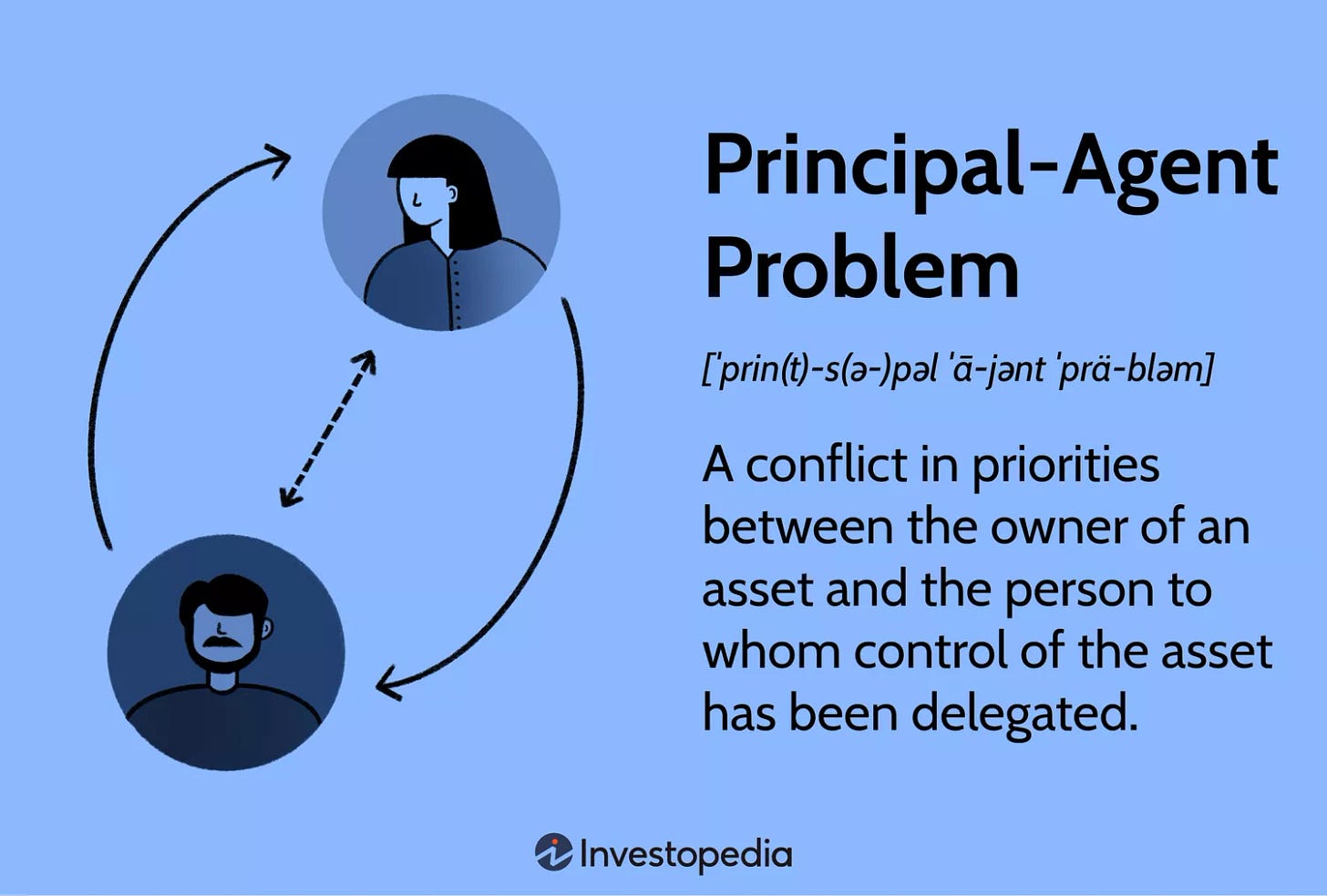
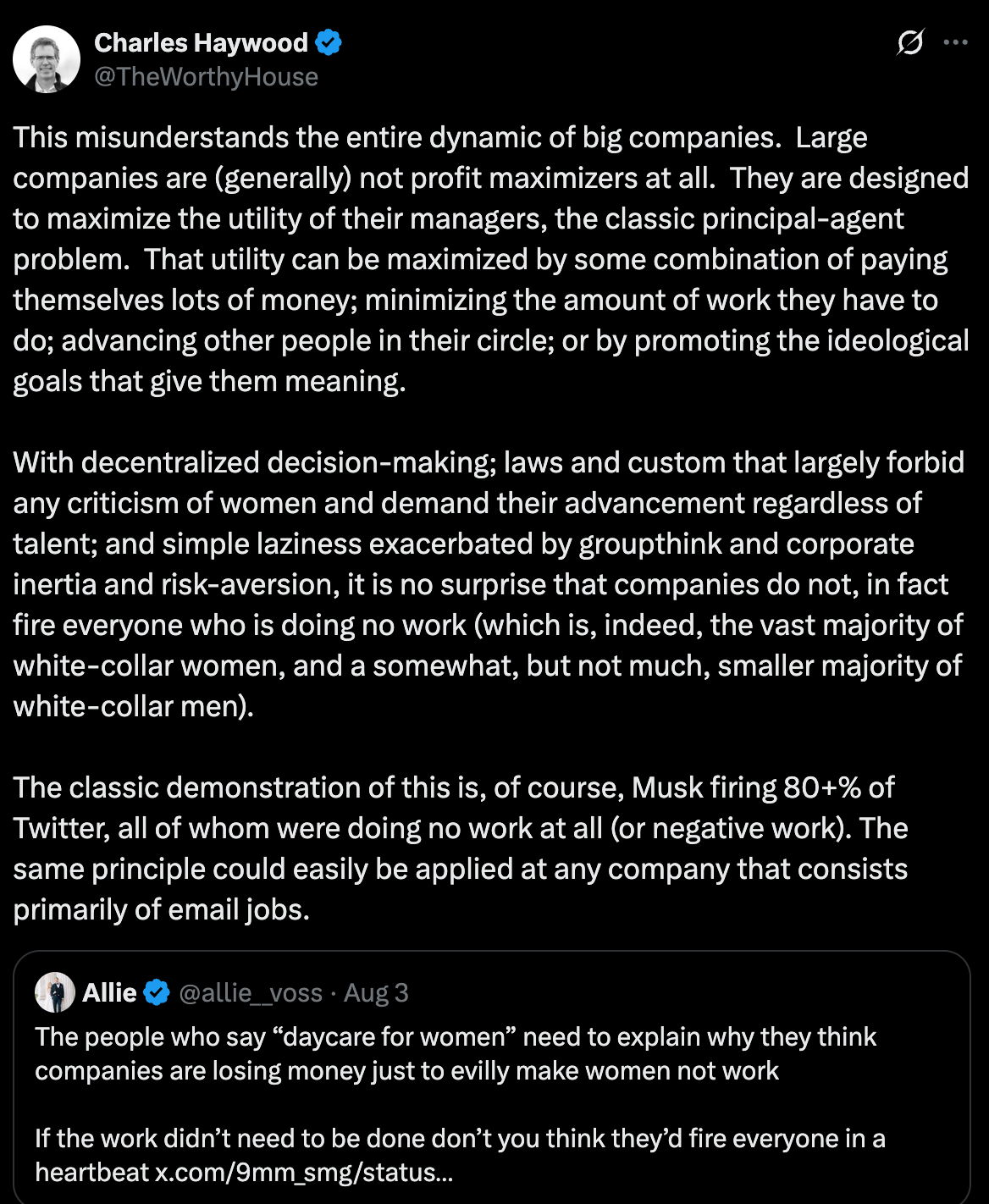
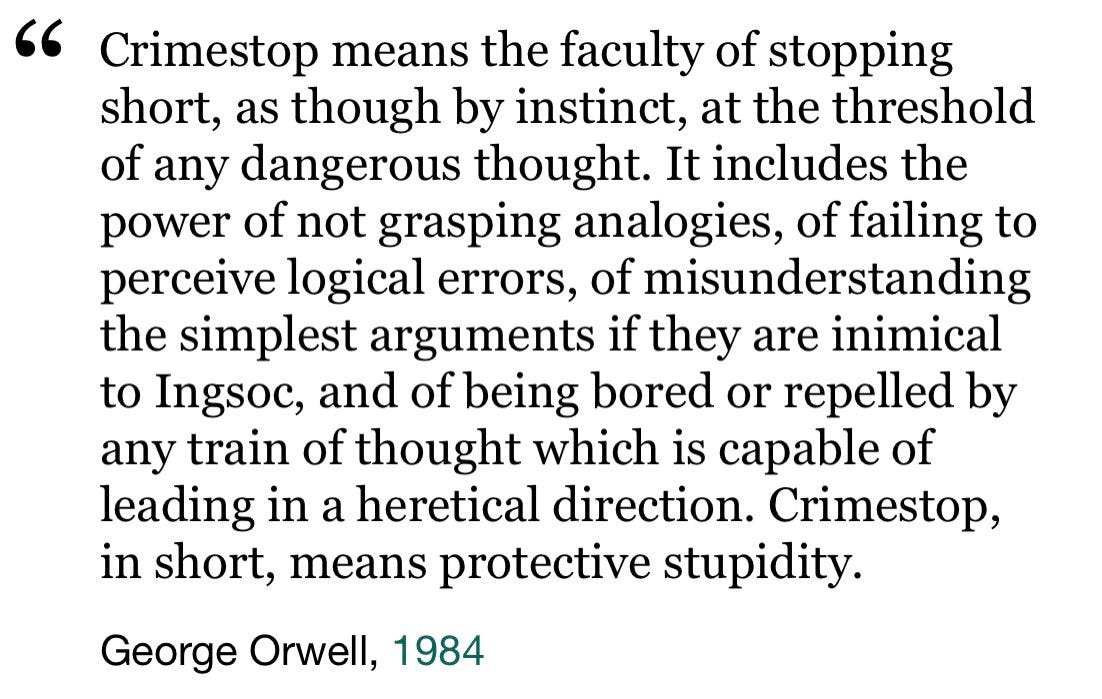
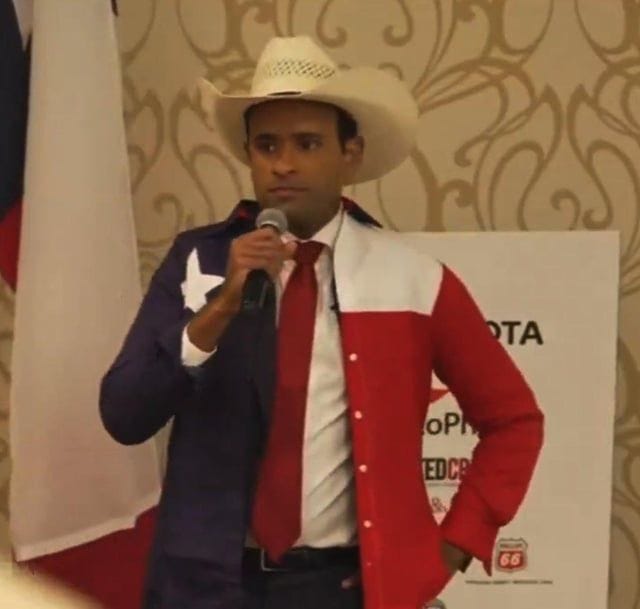
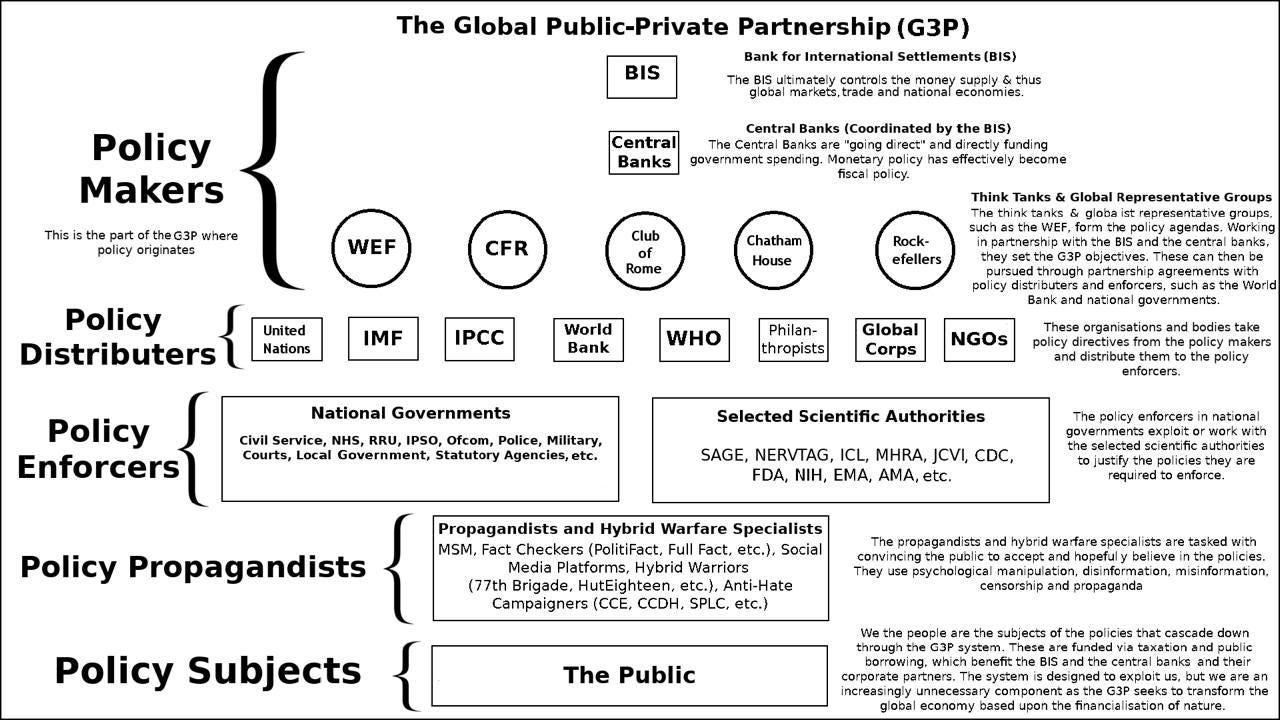
I think you are over weighting the importance of social identity here. Use of social identity is trying to apply to groups of individuals a coherency that only barely applies to individuals. The issues of no two individuals having aligned preferences or interests is what causes the principal/agent problem in the first place, and the larger the group gets the bigger those differences will be. That is the fundamental problem addressed in Public Choice theory, and social identity doesn't solve it. The importance of social identity is thus vastly overrated, an analytical red herring.
Interesting. In general the danger is Trump could NEVER meet rising expectations, especially after decades of abuse- that he’s ending- but it’s not enough. Of course not. We’re only human and We.Want.Blood. 🩸.
However in particular;
- You’re slamming Stu Scheller in the footnote for not pursuing revenge?
Or do I misunderstand?
As for Dan Boingo - I think we aren’t looking at his choices. Or his orders. From Trump.
In the case of the matter of retribution IF and WHEN lies with the President and he is or isn’t at his schedule.
One could reasonably argue the matter of the Coup and the Intelligence and Law Enforcement agencies being involved in domestic coups (going back to Nixon and JFK) is more important.
What Scheller is doing is making Restitution, as opposed to Retribution called accountability.
Actual Accountability would be Joe Biden, Fauci, possibly Lloyd Austin. Biden is beyond any accountability as he’s been senile since he started campaigning in 2019. Austin is probably at deaths door.
Before we demand the lynching of subordinates we can have true accountability at actual mens rea (guilty mind) people , not confused or misled subordinates.
I have personally been put through worse wringers than this… and I am not after revenge.
On the matter of Scheller the policy is restitution not retribution, on the matter of Boingo he’s on Trump’s schedule not the Internet.